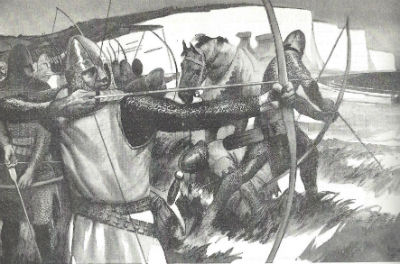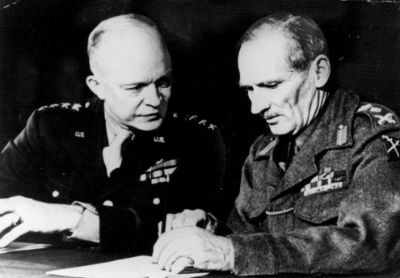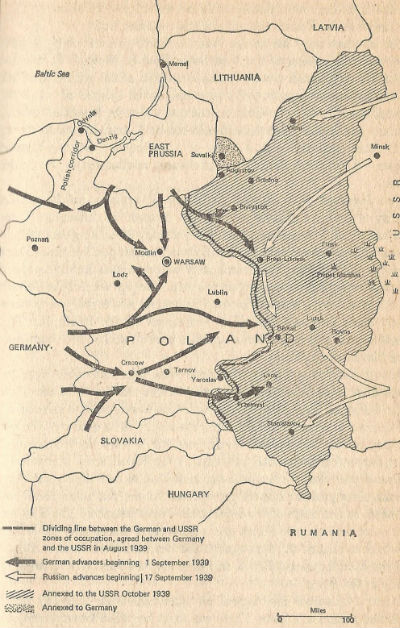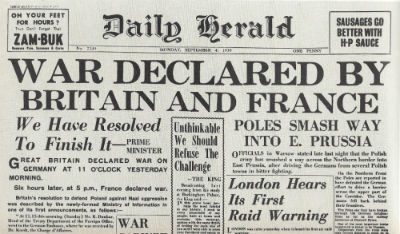80 Years After…The Hinge of Fate
By Neil Earle
Well might President Donald Trump schedule a visit to Poland this September. It was eighty years ago when German Chancellor Adolph Hitler launched his mechanized legions on Poland – September 1, 1939 – that turned the course of history. In 1939 the European continent was still the fulcrum of world history.
The British and French both held vast world empires, Germany was a powerhouse, the Soviet Union seemed like a first-rate military power.
Two days after Hitler’s attack on Poland and the British and French government declaration of war on Nazi Germany, the conflict was still a largely European war, even though most of the British Commonwealth nations followed Great Britain into the conflict.
The Polish capital at Warsaw soon collapsed to the Nazis in the world’s first blitzkrieg (“lightning war”), following a dastardly invasion from the east by Soviet forces. Sitzkrieg followed blitzkrieg. For nine long months Germany and the Western Allies faced each other. American journalists labeled it “the Phoney War.” Not for long. One hour before dawn on the morning of April 9, 1940 Denmark and Norway were handed an ultimatum from Berlin: Accept “the protection of the German Reich.”
May 10 came the German thrust on the Western powers. Holland fell in four days. Belgium lasted only 12 days longer. A month later Britain had barely rescued her army from total surrender with the “Miracle of Dunkirk” whereby 860 boats under costly naval protection rescued some 340,000 British, French and Belgian troops from shame and surrender. France soon surrendered while Britain held on, snarling and defiant.
The Widening War
That late summer of 1940 Britain’s Royal Air Force handed Hitler his first setback – the aerial Battle of Britain where two thousand young airmen and German strategic blunders saved the British Isles from occupation. The island nation lived to fight another day, emerging later in 1944 as the all-important staging ground for the largest combined military operation in history – D-Day, the invasion of Nazi-held France on June 6, 1944. This proved the turning point in the Second World War.
But how different the world strategic picture was in 1944 compared to 1940! By then a European conflict had broadened into true total war. When Hitler invaded Soviet Russia in 1941 and the Japanese struck the American fleet later that year at Pearl Harbor, a very different world power arrangement was shaping up. “The Hinge of Fate” had turned.
True to a farsighted prophecy made by a French aristocrat more than 100 years earlier, Russia and America were to dominate the globe for the next 50 years. “All other nations,” Alexis de Tocqueville wrote,” seem to have reached their natural limitations, but these are still in the act of growth. Their starting point is different and their courses are not the same; yet each of them seems marked out by the will of Heaven to sway the destinies of half the globe.”
Was this true? Were America and Russia’s Cold War of propaganda, threats and economic rivalry somehow under the purview of God Almighty? Does God still have a hand in the destinies of nations as he clearly did in Old Testament times? Was wise old Ben Franklin right at the American Constitutional Convention in 1787 when a new nation was being put together. Franklin had urged prayers for successful deliberations by counseling: “If a sparrow cannot fall to the ground without his notice can an empire arise without his aid?”
A Hidden Hand?
Such comments raise intriguing and even transcendent issues. When it comes to Biblical history we have access to such well-dated events as the fall of Babylon to Persia in October, 539, alluded to by Biblical prophets and attested by secular writers (Isaiah 45, 46). But there are strange and surprising events that occurred after the Bible canon was closed that raise significant issues of how often history seems to turn on a dime, and making wise observers raise the probability of some unseen hand intervening.
At the Battle of Tours south of Paris in October, 732 AD Charles Martel and the Franks repulsed an invading Muslim army that seemed headed for the overlordship of Western Europe. Then a strange false rumor spread through the invader’s ranks that the Franks were raiding their spoil in the rear. This led to a massive withdrawal from the main battle which the Franks exploited in what the great Von Ranke called “one of the most important epochs in the history of the world.” Without that victory mosques might have been erected where Westminster Abbey and Notre Dame now stand.
 English archers with their longbows at Hastings. The victory of William the Conqueror opened England to the Norman-French, who shared its later history.
English archers with their longbows at Hastings. The victory of William the Conqueror opened England to the Norman-French, who shared its later history.Skip ahead to 1066, once the most famous date in English history. At the Battle of Hastings between English forces under King Harold and invading Normans from France, a crucial turn came when the king was shot through the eye with a stray arrow. This event strangely paralleled the death of King Ahab by a stray arrow in 1 Kings 22:34, the fulfillment of a prophecy. Harold had already repulsed one invading army from the North but the Norman victory in 1066 was decisive. Historians conclude the Norman penchant for administration and strong central government providentially set England on the road to world power. The word “parliament,” for example, is a Norman French concept that has spread all around the world.
“Winds and Waves”
In 1588 that England was stirring again fitfully in its sleep as Elizabeth I and her sailors awaited King Phillip of Spain’s 124-ship Armada headed for the Channel. English fire-ships helped disperse the Spanish fleet whose admiral panicked and headed northward to round the British Isles on its way home. An unprecedented gale sprung up smashing most of the “invincible armada.” Queen Elizabeth struck a medal with the inscription “God blew and they were scattered,” a direct reference to Psalm 48:7. In 1597 Philip sent another fleet which met a similar fate.
At Long Island, New York in August, 1776 the wind blew the other way for the British or refused to blow at all. George Washington trying to defend New York had advanced hastily onto Brooklyn Heights across the mile-long East River and into a trap. Outmaneuvered by the redcoats, the American army was stranded with its back to the water. The trap seemed set but…the British Admiral waited for a wind to blow his fleet up the East River to cut off the American escape and end the war in one movement. The wind never came. The night of August 29 Washington stealthily escaped off his desperate position. The next morning – still trapped – a fog allowed 9000 men to finish their escape across the channel by an event Washington attributed, as he did many others in his life, to “the interposition of Providence.”
Even the loss of America could not stop England’s rise to world power but it was never inevitable. In June, 1815 a British army took defensive positions against the fast-moving French emperor Napoleon on the field of Waterloo. The night of June 17 was dreadful with an almost manic rainfall. The mud the next day forced Napoleon to delay his famed cavalry and artillery attacks which gave time for the British to hold until Prussian reinforcements arrived late in the day. The bad weather also hindered the arrival of provision for the emperor’s hungry soldiers. The French author Victor Hugo proclaimed, “If it had not rained between the night of the 17th and 18th of June, the future of Europe would have been changed.”
 Eisenhower with Montgomery planning D-Day.
Eisenhower with Montgomery planning D-Day.Then in 1940 came mega-Long Island – the Dunkirk evacuation of 330,000 British, French and Belgian troops across the amazingly calm English Channel as 860 little boats guarded by the Royal Navy got them off. Meanwhile bad weather to the east grounded the Nazi air force from finishing off the men trapped on the beaches. A British housewife told an interviewer: “They can say what they like. They can call it luck. They can call it a miracle, but I say it was the hand of God.” There are millions who still agree with her.
Four years later in June 1944 the Allied forces gathered in Britain were seeking to re-cross the Channel. The date was set for June 5 but winds and rains of almost hurricane force lashed commanding General Eisenhower’s little tent on the South Coast. Then his meteorologist made a surprising prediction – a brief change in the weather pattern would make the invasion feasible for June 6. Eisenhower made the decision and later told Time magazine (June 16, 1952): “If there were nothing else in my life to prove the existence of an almighty and merciful God the events of the next 24 hours did it…The greatest break in a terrible outlay of weather occurred the next day and allowed that great invasion to proceed with losses far below those we had anticipated.”
Man Proposes/God Disposes
Perhaps there is a reason for the old adage, “There are no atheists in foxholes” and claims of what some call a Hidden Hand in history abound. The theological problems these conclusions lead to are profound and even difficult. Reseracher Elesha Coffman says about the defeat of the Armada that God’s intervention hand is often a matter of lively debate but “what matters is people at the time thought he did.” The same after the deliverance at Dunkirk.
Long ago Isaiah 46:10 stated that there is a God in heaven who knows the end from the beginning. Daniel told the King of Babylon the same thing (Daniel 2:21). Jesus told Pontius Pilate the Roman governor: “You have authority over me only because it was given to you by God” (John 19:11).
These were bold words from Jesus, a condemned criminal but very consistent with the way God orders and governs his world according to the Bible. He reserves the right to intervene as he sees fit, even if he chooses to remain in the shadows. Joan of Arc arising to save France in the 1400s and Charles XII of Sweden saving the Protestant cause in the 1500s show these interventions are not confined by geography or nationality.
We can all sense the hinge of fate turning again in our lifetime and we do not know the final outcome. The Americans and Russians who faced each other after the Hinge turned in the 1940s are in different positions today, perhaps immensely weaker. Cold War I between the Americans and the Russian is now over, the Soviet Union is no more, America’s national debt hangs over her head by a rotten thread, China is flexing her muscles and regional powers such as Iran and North Korea strut themselves on the world stage.
But the Hidden Hand, we may conclude, is also there as the unseen arbiter and Judge of the Nations. It’s a wise saying some Christians have, “We don’t know what the future holds, but we know who holds the future.” Of that there seems evidence for those who want it.
Sources:
Katherine Carter, Hand on the Helm
Paul Johnson, A History of the English People
Michael Medved, The American Miracle: The Role of Providence in American History

